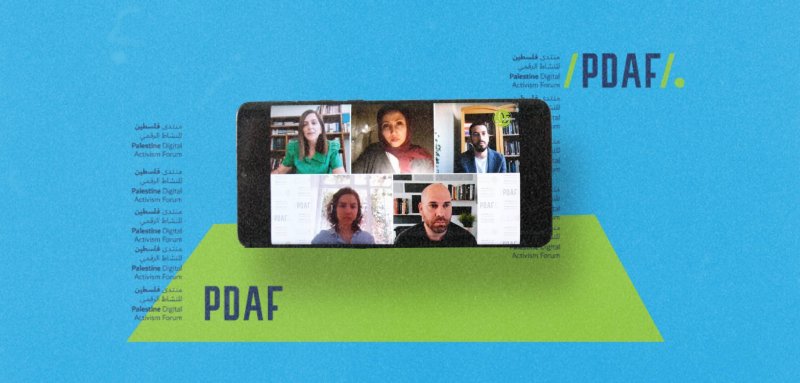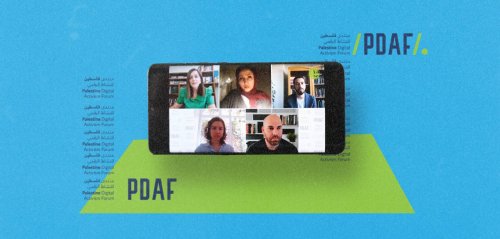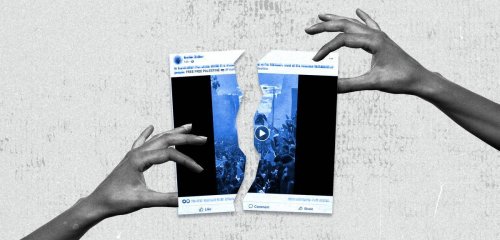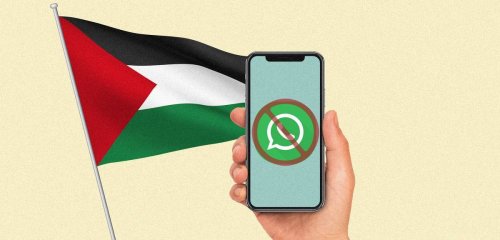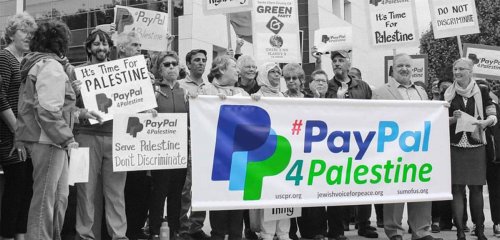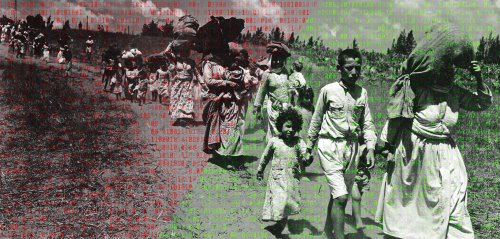One year ago, Heba, a Palestinian young woman who works as a speech and hearing specialist from the occupied West Bank, sought to launch a fundraising campaign to finance her master's studies outside Palestine through the famous "Gofundme" website, based on the advice of many friends and acquaintances.
However, her attempt was met with an obstacle; that she could not launch the campaign from inside Palestine or link it to any Palestinian bank account. Her available option was to resort to a "trusted" person residing abroad who could launch the campaign and link it to his non-Palestinian bank account.
Fortunately, Heba's brother was residing in Germany at that time and used his bank account to launch the fundraising campaign. Nevertheless, the campaign did not succeed, and the Palestinian young woman did not raise enough funds to complete her studies because it required even more things – a lot of connections and donors from outside Palestine.
Heba tells Raseef22, "The issue is not limited to this platform alone; most platforms that I tried to create an account on to collect donations required having a non-Palestinian bank account, even though one of these platforms was Islamic. I discovered many things during this process, such as the fact that transferring money to Palestinian accounts is always linked to supporting terrorism, which made me very angry."
What Heba experienced, and what Palestinians regularly experience inside the country and in the diaspora, is a form of systematic digital discrimination against them. This was one of the main topics discussed at the "Palestinian Digital Activism Forum," which concluded its activities on May 25, 2023.
The events, which were distributed between Ramallah, Haifa, the besieged Gaza Strip, and the occupied Palestinian territories, included dozens of seminars and workshops held both directly and digitally (via "GoogleMeet") in parallel, with the attendance of dozens of guests from around the world to discuss the discrimination that Palestinians face in the digital space and possible advocacy methods.
This discussion requires "many years of struggle and cumulative work".. The Palestinian Digital Forum poses pressing questions on ending digital, economic and tourism discrimination, as well as on content related to Palestinians on the internet
The seminars sought to find answers to pressing questions, including: How does digital discrimination against Palestinians and oppressed communities on social media platforms affect digital rights and freedoms? How do tourism apps, digital maps, and archives affect the narratives of oppressed peoples? How does digital economic discrimination affect the rights of Palestinians to freedom, justice, and dignity? How do legislations issued by the European Union affect the digital rights of Palestinians? Also, "The digital divide in Palestine: Internet access denied and its impact on education, work, and activity."
Palestine's digital voice
Regarding the importance of the forum, which is being held for the 7th consecutive year, Muniya Daher, Media Coordinator at the Arab Center for the Advancement of Social Media (7amleh), tells Raseef22, "This is the first time in three years that we have had public and prominent events after the pandemic. Therefore, we made sure that the forum's conclusion is diverse in terms of speakers, guests, and comprehensive to a large extent all the digital aspects that witness various violations of our rights as Palestinians."
Muniya emphasizes the importance of the conference covering a wide range of Palestinian cities, saying, "To make the conference more comprehensive and help us reach people with various orientations, it was important for us, in addition to having the conference on the ground, to launch it digitally because there are millions of Palestinians and advocates for Palestinian rights around the world who are interested in participating with us."
On the other hand, Nadim Nashif, Director of 7amleh, tells Raseef22, "We see the forum as an integral part of 7amleh's work, and we look forward to it every year. We consider it a cumulative effort. The 7th edition came in an integrated manner and managed to bring together 1,500 participants from around the world in digital and high-profile events in various Palestinian cities. With that, we were able to overcome the barriers and obstacles imposed on Palestinians to explore possibilities of overcoming the digital discrimination imposed on us."
How does digital discrimination against Palestinians and oppressed communities on social media platforms affect digital rights and freedoms? How do tourism apps, digital maps, and archives affect the narratives of oppressed peoples? How do EU legislations affect Palestinian digital rights?
The digital violations do not end
Palestinians around the world face many harassment and violations when covering and discussing Palestinian issues online. Often, individuals are targeted by Meta, the parent company of popular social media platforms such as Facebook, WhatsApp, and Instagram. This includes account closures and deletions, as well as reducing access to accounts supporting the Palestinian cause and covering Israeli violations against Palestinians.
The Palestinian Digital Forum this year was keen on hosting several figures from "Meta" to discuss these harassments and possible solutions to overcome such measures. Nadim Nashif adds, "The Oversight Board for Meta serves as a tool to monitor the company's actions. The board is an independent body responsible for overseeing issues related to content management policies within the company. It is essential to shed light on the potential of utilizing the board's work to influence platform policies regarding Palestinian content management."
Nadim points out that the Oversight Board for Meta "played a significant role in the May 2021 report on due diligence related to human rights issues concerning Meta's impact in Israel and Palestine. The board issued a recommendation for Meta to conduct an investigation, and its findings indicated the company's "excessive" control and management over Arabic content compared to Hebrew content.
Meanwhile, the forum attempted to highlight the potential for influence through the Oversight Board for Meta to address more cases aimed at exposing the excessive censorship faced by oppressed communities in general, and Palestinians in particular.
Map apps like Google Maps don't reflect the reality on the ground, such as roads that Israel prohibits Palestinians from using due to the presence of settlements. This can pose a real danger to Palestinians who use such apps due to the lack of such warnings
Muniya adds, "It is important today to defend the rights of Palestinians to freely speak out on social media platforms about digital violations against them. One of the most important things we need to address is awareness of such violations because awareness and knowledge of what is happening lead us to the stage of exerting pressure to end such violations."
Muniya clarifies that discussing such violations and the violated measures of Palestinian digital rights should lead to changing the policies of social media companies that are discriminatory. She says this "requires long-term work and takes a long time... years of struggle and cumulative work."
Muniya continues by stating that this is why the primary role of the Palestinian Digital Forum is "to accumulate awareness year after year, accumulate information, and raise different yet similar questions each year to achieve our main goal." She adds, "When we talk about ending digital discrimination against Palestinians, we are talking about a theme inspired by last year's report on bias in content management policies in Arabic compared to Hebrew."
She emphasizes that the report served as a "clear evidence" against Meta's evasion of acknowledging the existence of this systematic digital discrimination, and it contradicts their claims that they apply the same standards worldwide without discrimination.
Protecting the digital data of Palestinians
Meanwhile, the issue of protecting data for Palestinians remains one of the most important topics discussed during the forum and a subject that concerns Palestinians around the world when using various social media platforms, especially amid concerns about Israeli authorities accessing users' personal data and the potential consequences.
"It is important today to defend Palestinians' right to freedom of speech on social media regarding digital violations against them. Awareness of such violations and knowledge of what is happening moves us to the stage of pressure to end such violations"
The protection of digital data is closely linked to international decisions related to rights, particularly privacy. On this, Nadim Nashif states, "The European Union aims to regulate aspects of the digital transformation through various legislations, which seek to inspire the international community, such as the European Union's general law, the law on privacy and personal data protection (GDPR), the digital surveillance law, and the European Union's law on digital services (DSA), as well as the Artificial Intelligence Law and the Online Safety Bill in the United Kingdom and other laws that affect the digital rights of Palestinians and countries in the Global South."
Nadim adds, "Although these texts contribute to enhancing the protection of the right to freedom of expression online and other fundamental rights in several cases, the practical implementation of their provisions may also deepen existing inequalities in other cases."
Muniya further contributes, "Practically, when we talk about data protection in the digital world, which contains a lot of personal information across various platforms, there are numerous legislations and laws around the world that address user protection and data. However, in practice, the laws are not applied to a level where the user feels digitally secure."
"In the Palestinian context, we are talking about a significant flaw in the protection of personal data. In our campaign, we have highlighted this particular flaw in numerous reports. In practice, we face many problems in such violations by Israeli authorities, such as surveillance and others. However, our goal in the campaign is to push for a protection law for Palestinians, at least in specific areas like communications and economic data," continues Muniya.
Digital discrimination in the field of education and advocacy
The digital discrimination against Palestinians also affects the education sector and extracurricular activities due to Israeli control over the internet and on the ground.
Muniya says in this regard, "When we talk about digital discrimination, we cannot ignore the reality of education in Palestine and the significant gap between us and many other societies in the world. Until this day, there is Israeli control over the internet and infrastructure. Therefore, we suffer from limited internet access, which significantly impacts the communication sector and information technology that is almost fully controlled by Israel."
As an example, she mentioned the restriction on using networks beyond 3G in the West Bank or 2G in Gaza, while the rest of the world has moved on to using 5G.
Raseef22 is a not for profit entity. Our focus is on quality journalism. Every contribution to the NasRaseef membership goes directly towards journalism production. We stand independent, not accepting corporate sponsorships, sponsored content or political funding.
Support our mission to keep Raseef22 available to all readers by clicking here!
Interested in writing with us? Check our pitch process here!
